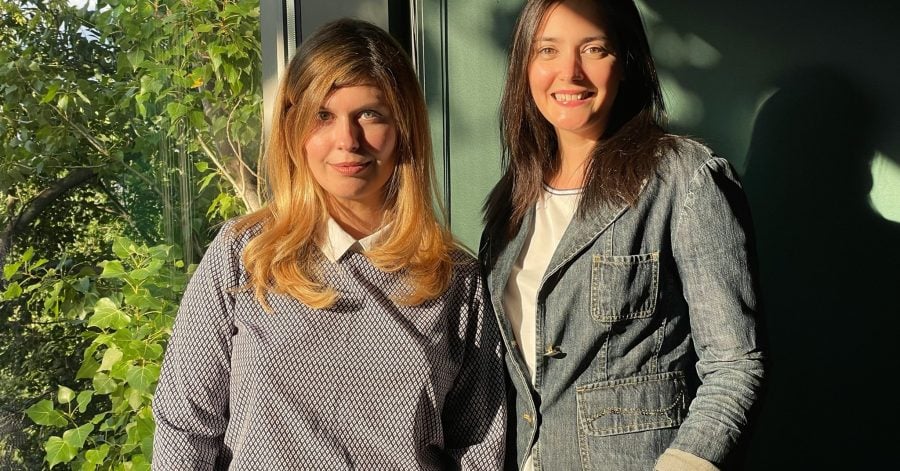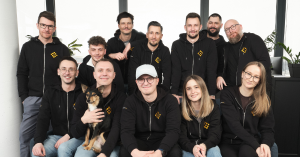Five years after the launch of FilmChain, the Romanian-founded fintech targeting the film industry, the two co-founders, Maria Tanjala and Irina Albita, felt the need to grow their solution. Therefore, 2022 began with an undisclosed financing round, supported by both financial experts, as well as entertainment connoisseurs.
The founders shared that due to the increasing market demand for their collection account management platform, and the launch of the SaaS royalties-management platform, they were propelled to grow their team on both the engineering side, as well as in the sales department.
As we are in the middle of the film and TV awards season, we talked to the FilmChain “Women in Tech”, who are childhood friends, about their journey, blockchain evolution, and 2022 goals.

THE RECURSIVE: Can you share with us the journey that inspired you to develop your startup?
Maria Tanjala and Irina Albita: We were speaking at length about some of the challenges Maria was experiencing every day as a producer. Our brainstorms led us to co-found Big Couch, in 2014. This was a fintech startup in the entertainment industry that enabled independent filmmakers and video content creators to co-invest in projects they were working on, through a funding mechanism we named “crewfunding”.
We recognized that the opportunity of payments and reporting is much bigger across the industry, which led us to pivot to what is right now FilmChain.
FilmChain’s mission is to transform traditionally slow and opaque recoupments by empowering the industry with transparency and data. We were baffled by how long it took people in the industry to get paid. Such a thriving industry was relying heavily on very manual and slow processes that couldn’t be verified efficiently; this was causing the participants to lose money by up to 30%.
Can you tell us more about the platform?
At the core of our solution is the automation of the revenue calculations. It was important for us that any type of deal can be visualized on a dashboard, for beneficiaries to be able to verify their contributions and how much they recouped at any given point.
The platform calculates entitlements automatically and reports accordingly in perpetuity – work that at an independent level would often fall on the producers’ shoulders to deal with on spreadsheets. And unlike spreadsheets, where data entry can result in changes to formulas, once set up, the system continues to provide correct results.
Why develop the solution in the UK and not Romania?
We still have deep connections with the technology and film and TV communities in Romania. Yet, we were both living and working in the UK for many years, so we decided to launch in the second largest market for filmed content in the Western countries, the UK, and from there to expand across Europe, North America, and globally.
The early-stage R&D funding support from the UK Government was also essential in our development of the product and setting up of the team. We also benefited in the UK from a great network of advisors and academic partnerships, including the academic collaboration with Imperial College London while developing the blockchain technology.
Out of a team of 12, we have two team members based in Romania, Ioana and Adrian, and plan to continue to hire there.
What have been the development phases so far since 2017?
We launched our platform in February 2018 at the Berlinale European Film Market, part of the festival’s startups program. It was an incredible launchpad to introduce our company globally.
This was soon followed by landing our first contract with a leading production company working on their German-Bulgarian award-winning feature film. From there, we continued to grow our client base to over 55 active titles, managing over 1200 beneficiaries (film funds, investors, producers, and talent), in the UK, Europe, Israel, Australia, Canada, and the USA.
Four years after our soft launch at Berlinale European Film Market, we launched in February 2022 our enterprise product alongside a leading German content distributor – Alamode Films, as we are supporting Dario Argento’s return to the big screen with his latest production “Dark Glasses”.
Do you feel the current evolution of blockchain technology makes it more viable to scale this solution internationally in 2022 compared to 2017? Have you been waiting for this wave to position yourself on the right market at the right time?
We have navigated through many blockchain hyped periods (ICOs, token sales) in the entertainment space. We are coming out of the experimental and highly R&D stage of many blockchain pilots.
Some projects promised the world and delivered little or nothing at all; others continue putting in the good work and show clear progress. Many pivoted along the way. In this landscape, it’s easy to see why the skepticism is high.
From the beginning, we decided on focusing on the fundamentals of blockchain and making sure the tech we build is not for tech’s sake, but for solving real problems, and for the companies in the industry to use it.
We also recognized that the blockchain space can seem intimidating and overwhelming, with high knowledge barriers to entry for many of our clients. When communicating with media companies, we emphasize the benefits of the technology without delving too much into the technical details.
This has proven a clear path to adoption and we feel the client names in our portfolio represent clear proof. Nonetheless, we were very proud to support films like Mad Heidi with a custom-made infrastructure, which utilized smart contracts for funding as well as the distribution of revenues.
The developments of Web3 are an exciting time for companies like us, which have been evangelizing the technology since 2018. We are excited about the possibilities it presents for content creators and democratizing access to finance and distribution. We continue to believe that the entertainment industry still has a way to go to resolve its internal fight between convenience and fairness.
Can you share with us more about how you divide the responsibilities as Co-CEOs?
Having a great communication flow and a strong shared vision are the cornerstones to making such a partnership work.
The co-CEO structure has been a natural fit for us at FilmChain and we have taken many cues from successful co-CEO partnerships, including those at Netflix and Salesforce.
There are more areas where our input is shared than you might think, including managing the team and product. Maria has taken the not-so-easy task of leading our investment round conversations, while Irina kept a strong grip on our P&L.
What would you like other Women in Tech to know if they want to follow your steps?
We don’t believe that women in tech need to follow any steps, but to build the paths and careers they’re dreaming of, to believe in themselves, and trust their intuition when making hires.
We are in awe of the many women in leadership roles who continue to explore their empathy, build healthy work environments, actively listen to their colleagues while delivering outstanding services and one-of-a-kind businesses.
What are your goals for 2022?
We have big goals for 2022, a year when the industry is coming back to life stronger after the pandemic. We hope to resume team-building events where our remote-first team can come together after two years of being apart.
We are looking at a 5x growth by the end of the year, in terms of the number of titles and beneficiaries we are managing. We also plan to convert our two pilot enterprise clients into long-standing paying clients and bring an additional enterprise client to sign with FilmChain.
Do you sense any other trends in the digitalization of the entertainment industry?
We are betting on radical digitalization in the industry.
We see this at an enterprise level – from medium to large content distributors, studios, and broadcasters. When they are successful, these enterprises have an ever-growing number of titles. This means more reports need to be prepared. Yet, many still work with spreadsheets, and with this setup, they cannot keep up with the growth of the business.
This creates a bottleneck and reporting becomes ad hoc, reactive, and error-prone. The lack of reporting means distrust and frustration with rights owners and talent. We have seen an ever-growing number of lawsuits driven by the well-known talent that is adding extra pressure on big companies to better manage their processes. Companies have been growing their spending up to 7% of the profit on accounting/ERP/finance software – and data show this will only go up.







